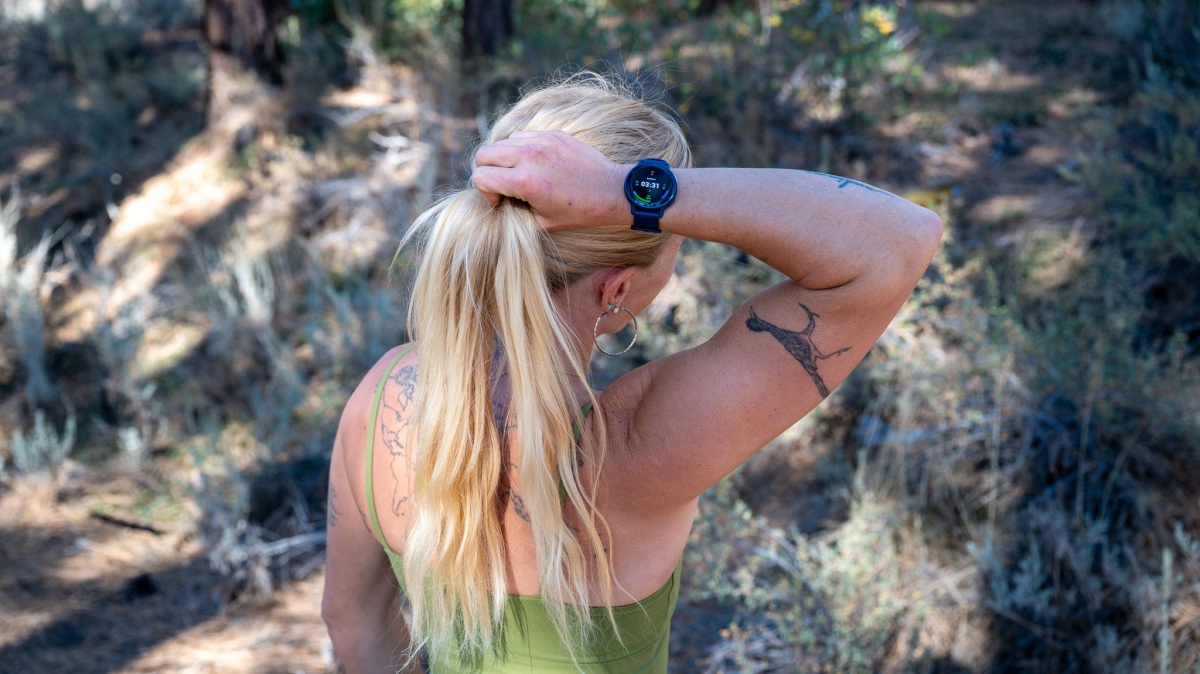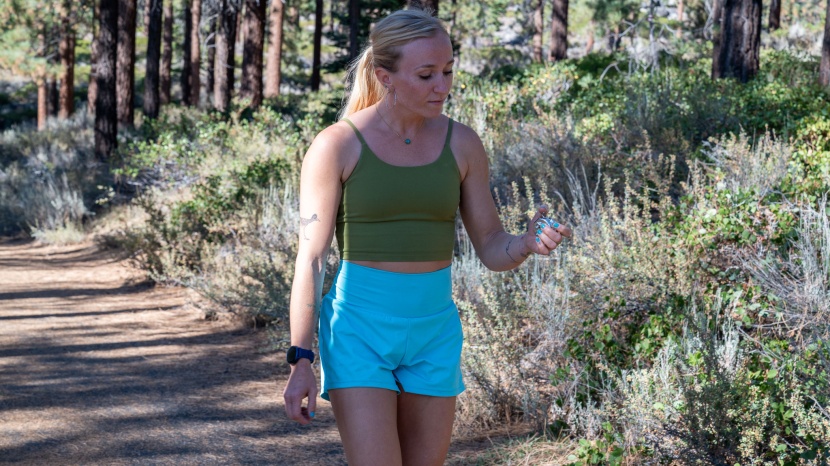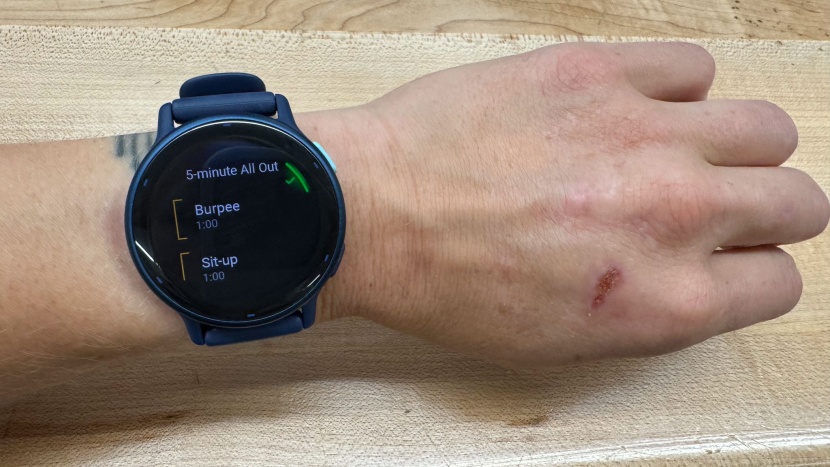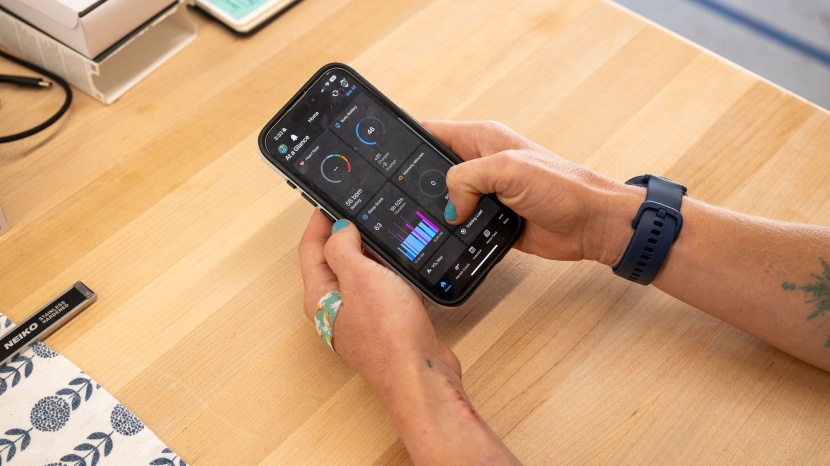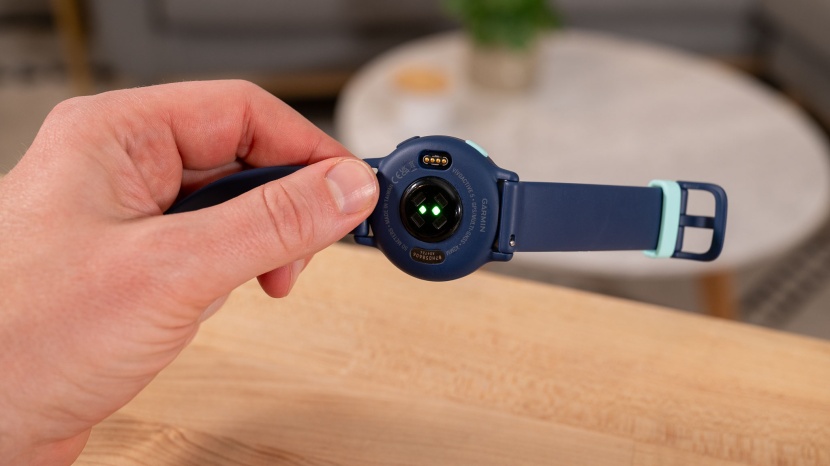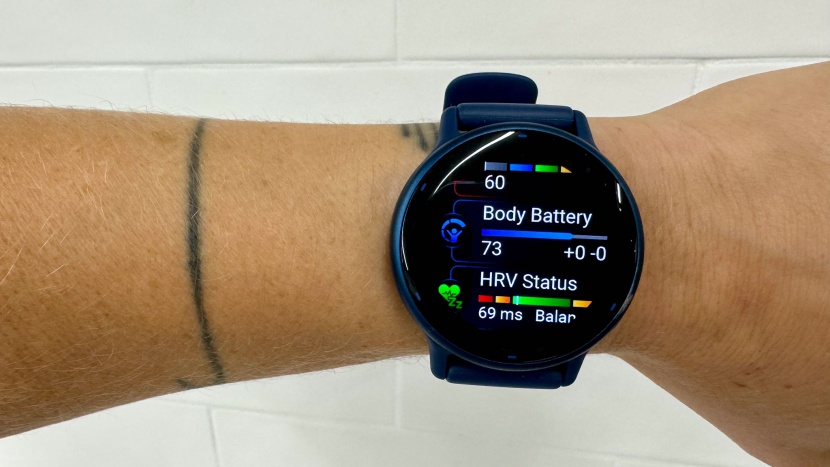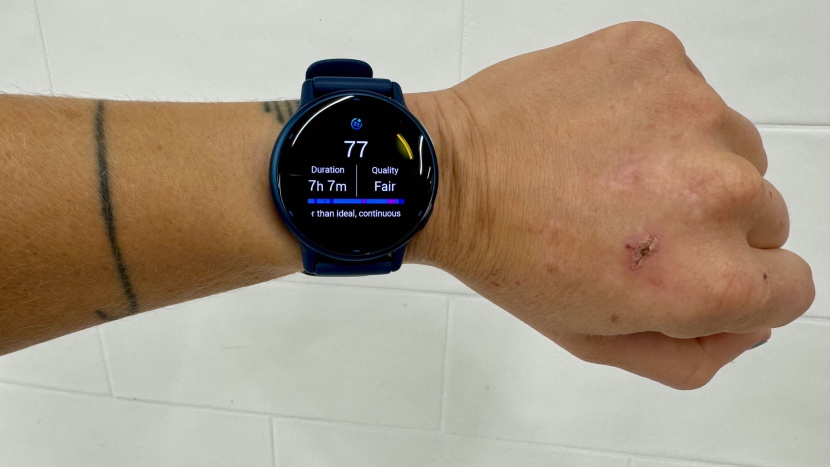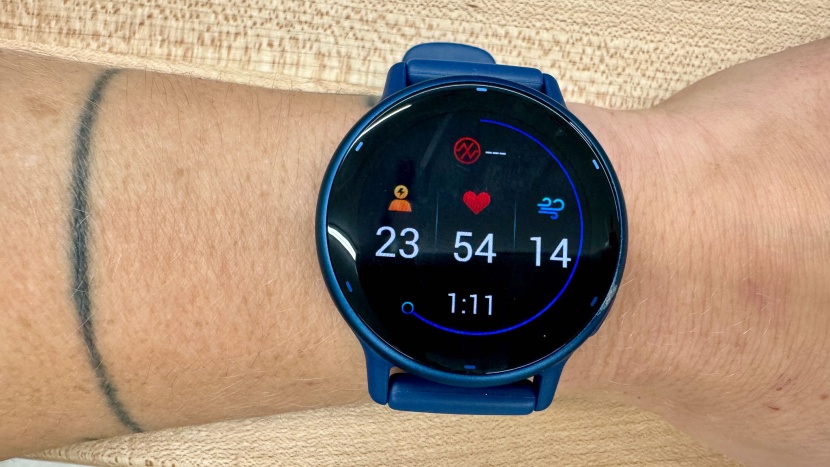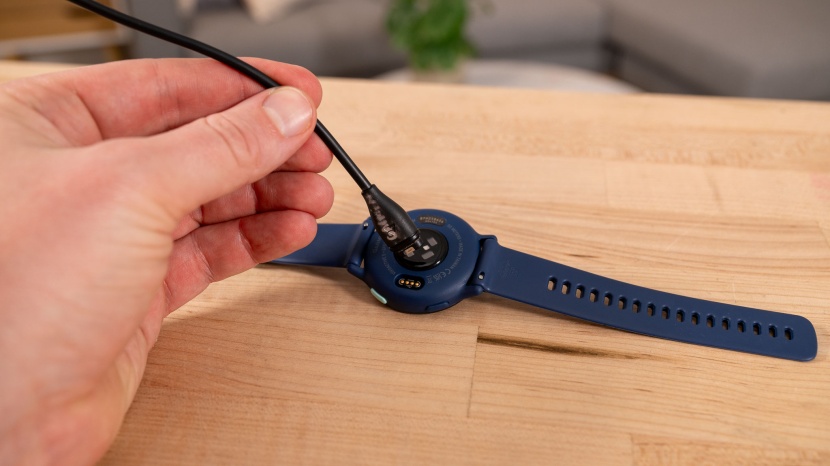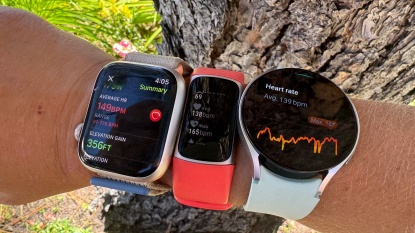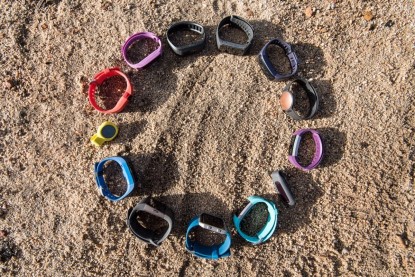Our Verdict
Compare to Similar Products
 This Product Garmin Vivoactive 5 | |||||
|---|---|---|---|---|---|
| Awards | Best Value for Athletes | Best Overall Fitness Tracker | Top Pick for Light and Simple | Top Pick for Minimalist Lifestyle Tracking | Best on a Tight Budget |
| Price | $300 List $243.89 at Amazon | $399 List $388.99 at Amazon | $160 List $119.95 at Amazon | $239 List $239.00 at Amazon | $50 List $39.99 at Amazon |
Overall Score  |
|||||
| Star Rating | |||||
| Bottom Line | An excellent fitness tracker for athletes at an affordable price | An excellent fitness tracker for multi-sport athletes and Apple aficionados, this device provides a ton of function beyond just recording biometrics and serving as a workout partner. The only drawback is a short battery life | A great fitness tracker from a brand that is synonomous with fitness tracking, this device offers function at a good price | An innovative device that integrates fitness tracking and lifestyle tracking while also being low-profile | The device offers a lot of function and value, although it has some limitations related to heart rate monitoring and health tracking |
| Rating Categories | Garmin Vivoactive 5 | Apple Watch 9 | Fitbit Charge 6 | Whoop 4.0 | Amazfit Band 7 |
| Fitness Impact (30%) | |||||
| Health Impact (30%) | |||||
| Ease of Use (20%) | |||||
| Battery (10%) | |||||
| Fit (10%) | |||||
| Specifications | Garmin Vivoactive 5 | Apple Watch 9 | Fitbit Charge 6 | Whoop 4.0 | Amazfit Band 7 |
| Measured Weight | 1.26 oz | 1.69 oz | 1 oz | 1.03 oz | 1 oz |
| Measured Display Diameter | 38.0 mm | 34.0 mm | 19.4 mm | 28.0 mm | 21.9 mm |
| Heart Rate Average Beats Per Second Off | 4.4 | 1.6 | 15.4 | 11.2 | 15.9 |
| Manufacturer Stated Battery Life | Up to 11 days 5 days display always-on |
Up to 18 hours Up to 36 hours in Low Power Mode |
7 days | 4-5 days dependent on usage | Heavy Usage: 12 Days Typical Usage: 18 Days Battery Saver Mode: 28 Days |
| Built-In GPS Tracking | Yes | Yes | Yes | No | No |
| Screen Type | AMOLED | OLED Up to 2000 nits |
AMOLED | na | AMOLED |
| Measured Charge Time | 1.70 Hours | 1.20 Hours | 1.60 Hours | 2.5 Hours | 1.75 Hours |
| Heart Rate Monitor | Yes | Yes | Yes | Yes | Yes |
| Sleep Tracking | Yes | Yes | Yes | Yes | Yes |
| Altimeter (Elevation Tracking) | No | Yes | No | No | No |
| Did a single charge survive a 3 day weekend? | Yes | No | Yes - highly depends on usage | Yes | Yes |
| Sensors | GPS, Glonass, Garmin Elevate Wrist Heart Rate Monitor, Pulse Ox Blood Oxygen Saturation Monitor, Compass, Accelerometer, Thermometer, Ambient Light Sensor | Electrical heart sensor and ECG app, Third-generation optical heart sensor, High and low heart rate notifications, Irregular rhythm notifications, Sleep stages, Temperature sensing, Compass with Waypoints and Backtrack, Always-on altimeter, High-g accelerometer, Ambient light sensor | Heart rate monitor and tracking, built-in GPS, SPO2 monitoring, 3-axis accelerometer, temperature skin, blood glucose tracking and NFC | 5 LEDs and 4 photodiodes | BioTracker™ 3.0 PPG biometric sensor (supports blood-oxygen, 1PD + 2LED), 3-Axis acceleration sensor, geomagnetic sensor |
| Memory | 4 GB | 32 GB | 4 GB | Up to 14 days (without syncing to phone) | Not mentioned |
| Connectivity | Bluetooth®, ANT+®, Wi-Fi® | Available cellular connectivity Works with Apple Watch For Your Kids (GPS + Cellular models) |
Apple iOS 15 and higher Android 10 or higher |
Apple iOS 16 or higher iPhone 6s or higher Android OS 10.0 or higher |
Android 7.0 and above, iOS 12.0 and above |
| Water Resistance | 5 ATM (50m) | 5 ATM (50m) | 5 ATM (50m) | -10m for up to 2 hours (band) -1m for up to 2 hours (with battery pack) |
5 ATM (50m) |
| Notifications | Text, call, push notifications | Text, call, push notifications including ability to call/text from watch | Text, call, push notifications | Can function as an alarm but does not give notifications | Text, call, push notifications |
| Alarm Clock Function | Yes | Yes | Yes | Yes | Yes |
| Music Control | Yes | Yes | Yes | No | Yes |
| Color Options? | -4 colors | -Aluminum (5 colors) or Stainless Steel (3 colors) -an absolute plethora of bands available |
-3 colors | -28 standard colors plus the option to create your own custom band (how fun!) -can add a custom engraving to any band option (add $25 to price) |
-5 colors |
Our Analysis and Test Results
Garmin is a well-known and respected brand in the fitness, outdoor, marine, automotive, and aviation industries. Their GPS watches and satellite communication devices have been at the forefront of innovation for several years. The Vivoactive 5 is one of the more approachable devices in their lineup and is built with similar technology as their upper-tier devices, such as the Forerunner and Fenix series smartwatches.
Fitness Impact
The Vivoactive 5 delivers a lot of function for its accurate GPS tracking, distance precision, step tracking, the ability to autodetect walks and runs, cycling tracking, and general workout tracking, but the elevation tracking leaves something to be desired.
GPS
The Vivoactive 5 includes a GPS sensor and also works with GLONASS (Russian) and Galileo (European) satellite navigation systems. Some other fitness trackers use the GPS antenna in a connected smartphone (or cell tower triangulation) for geolocation, but the Vivoactive 5 is self-contained and can provide distance, pace, and speed without a tethered smartphone.
Elevation
The Vivoactive determines elevation gain and loss by overlaying your route on a digital map. It works, but it isn't as accurate as direct measurement with a barometric altimeter. For some reason, the Vivoactive doesn't show elevation data on the screen.
Distance and Step Accuracy
The Vivoactive 5 had a 7% error rate when we tested it for measuring distances of walks and runs on a treadmill. For some reason, it was more accurate at measuring running distance than walking distance. It is also highly accurate at tracking steps with a 1% error rate.
Autodetect for Walks/Runs
With an ability to customize the autodetection to runs and walks, we were impressed with the Vivoactive 5's ability in this area. “It never failed to recognize and start tracking one of those activities,” commented our lead tester. It occasionally needed input to start tracking a mountain bike ride, but 90% of the time, it didn't need any prompting at all.
Cycling Tracking
With the cycling function engaged, the Vivoactive displays distance, speed, heart rate, heart rate zone, elapsed time, lap distance, and lap time. We wish it included elevation data (the Vivoactive 4 did), but we like that we can view a range of data by simply switching through the different screens.
Workout Tracking
Overall, we loved the workout tracking of the Vivoactive. When on a run, ride, or in the gym, heart rate data was easy to read. We especially liked the screen that showed our heart rate zone. There are a variety of prebuilt workouts in the tracker, such as run, bike, strength, cardio, and HIIT, with the option to customize intervals, rounds, and rest periods. In fact, the Vivoactive functions a lot like a little workout buddy, communicating via vibrations and sound. Cues for laps, pace, and so forth can be toggled as well. Our only gripe was that you need to use the app to dig into your stats; on the Vivoactive you just get a summary.
Trackable Activities Available
There are fifty-eight specific activities available on the Vivoactive, but you can also rename and create custom activities to add more to your list. There isn't a huge variety of lifestyle activities for tracking, but the range of sports is suitable for most people.
Community
We liked the ability to connect with a community of like-minded individuals or groups through the Garmin Connect app. You can view the profile and data of selected friends, share Live Track information (for real-time location sharing while running, hiking or cycling), view a news feed of friends, and compare metrics with other users. In addition, there is an option for participating in a variety of interesting challenges, such as the Mont Blanc Expedition (climbing 15,774 ft), the Therabody Sleep Challenge, or various cycling challenges.
Health Impact
We evaluated the health impact of the Vivoactive 5 by testing the heart rate sensor, diet tracking function, additional health indicators (such as EKG and blood oxygen), lifestyle tracking function, and sleep tracking. For the most part, the Vivoactive is a top performer in this broad metric. It is limited, however, in terms of its usefulness in diet tracking.
Heart Rate
In our testing, we compared the Vivoactive 5's heart rate monitoring against a Polar heart rate monitor (considered the industry standard for accuracy). The Vivoactive 5 demonstrated excellent overall accuracy, with one specific limitation: During recovery periods after intense intervals, when heart rate was decreasing, the Vivoactive 5 had a slight lag in detecting these changes. While it did catch up to the actual heart rate within a few seconds, this brief delay was consistently noticeable when compared to the Polar monitor's readings.
Diet
The Garmin system doesn't appear to prioritize diet tracking, at least not with the Vivoactive 5 or the other Garmin in our lineup (the Forerunner 965). You can log water intake, but the options are minimal, and this tracker wouldn't be a good fit for someone who wants rich functionality in this sub-metric.
Additional Health Indicators
Garmin provides a variety of health indicators that can be measured and tracked in addition to heart rate. There are monitors for inactivity, blood oxygen, EKG, skin temperature, mental stress, menstrual tracking, VO2 max, activity progress, and training load/recovery. The Vivoactive 5 also pairs with Garmin scales, provides a health snapshot (based upon average and max heart rate, stress, and heart rate variability), measures respiration, and offers a sleep coach that recommends how many hours you need.
Sleep Tracking
According to our lead tester, Garmin “provides you a ton of data but breaks it down in a way that most people can understand.” We also appreciate that the Vivoactive 5 makes it possible to easily track sleep (including restless moments, resting heart rate, average sleeping heart rate, respiration rates, and sleep stages).
We loved seeing all of this data and we gained a lot of insight into our sleep habits. We did find, however, that even though the Vivoactive 5 accurately captured when we went to bed and when we got up in the morning, it didn't always capture moments of wakefulness during the night.
Ease of Use
A fitness tracker is designed to be a 24/7 companion, so it has to be easy to use. We evaluated this by scrutinizing how difficult it was to get set up the tracker (and the app), what it was like to wear the tracker, the function of the display, connectivity with our smartphone and other apps, subscriptions (if required), and water resistance. The Vivoactive 5 is above average in these areas, but the tracker interface and screen quality aren't at the same level as the top performers in our line-up.
Getting Started
Overall, it is quick and easy to get the Vivoactive 5 set up for use along with the Garmin Connect app. It requires a few different activities and recovery scores over a couple of days to generate certain metrics, but it gets to know the user quite quickly.
Phone App
We like the Garmin Connect app, which contains graphs for every tracked metric. We have read of some users who dislike it, but it works well in our opinion, and we feel that it is easy to access our data and gain insight into our fitness level.
Wearability
The Vivoactive 5 is fairly comfortable, and we only occasionally snagged it on clothing with tight sleeves. We didn't have any issues, however, with it getting caught on backpack straps. The watch band is comparable to most other bands and otherwise offers lots of adjustability.
Display
Our lead tester shared, “I really appreciate how Garmin makes data accessible during workouts. Your info is presented in a way that helps inform you of where you're at while exercising rather than requiring you to stop what you are doing to check in” with an app. Selections are made using two buttons on the bezel and standard touchscreen motions. We never accidentally toggled anything we didn't want to, and the screen is reliable when wet or dry, which is to say that it is responsive to quick taps and swipes. The screen is also easy to read and the colors are vibrant.
Connectivity
You can receive and respond to texts, control music, and access a mobile wallet with the Vivoactive. We noted that we could view photos in a text message when paired with an Android phone, but with iPhones the image isn't viewable. There is an option for “Quick Reply” to a text, or you can customize replies through the Connect app. It also seamlessly connects to apps like Strava, so you don't need to take any additional steps to upload or share workouts.
Subscriptions
We love the fact that the Vivoactive 5 offers a ton of functions and excellent data analysis without a subscription! There are options to personalize your Garmin through Garmin Connect IQ (another free app) and some of those options require an additional cost since they involve third-party developers.
Water Resistance
We had no issues with the Vivoactive 5 while swimming, showering, or washing hands. It is rated to five atmospheres and can be submerged in water with no issues. We liked that the watch never accidentally toggled something or stopped tracking due to contact with water (which is an issue with some fitness trackers).
Battery
Our extensive testing trials of the Vivoactive battery revealed excellent performance. Although the battery didn't last 11 days for us, as Garmin claimed, we acknowledge that we were tracking a handful of activities each day. It would most likely last that long with normal use. As much as we appreciate the battery life of the Vivoactive, we aren't huge fans of the charging connection, which can be knocked loose by slight jarring motions. If everything stayed connected, however, the battery boosted fairly quickly (required 1.7 hours to go from 0% to 100%).
Fit
“It doesn't take long to get used to its presence,” commented our lead tester, “I can usually forget I am wearing it throughout the day.” Garmin seems to have found a wonderful middle-ground with the Vivoactive 5: it is big enough to actually read while running and working out, but it isn't so big that it causes discomfort. It also has a great fit on the wrist, according to our testers, who also called it “light and airy.” In addition, it doesn't produce painful pressure points with the sensors. The watch comes in one size with four color options.
Should You Buy the Garmin Vivoactive 5?
The Vivoactive 5 is an excellent option for someone who wants an accurate GPS fitness tracker that can help them achieve athletic goals but is mindful of the high cost of top-tier trackers or those that require a subscription for fitness data analysis. If you are training for your first marathon, 10K or trail running race, we think the Vivoactive 5 is a great choice. It will be a reliable training companion and will serve you well into the future.
What Other Fitness Trackers Should You Consider?
If you are more interested in lifestyle tracking or need a tracker that is more minimal, we recommend taking a close look at the Whoop 4.0 or the Fitbit Charge 6. Both are unobtrusive and offer a number of lifestyle tracking features that can help you gain insight into your general fitness and health habits. If money is not an object and you want the best device for athletes, then you'll be interested in the rich functionality of the Garmin Forerunner 965.


